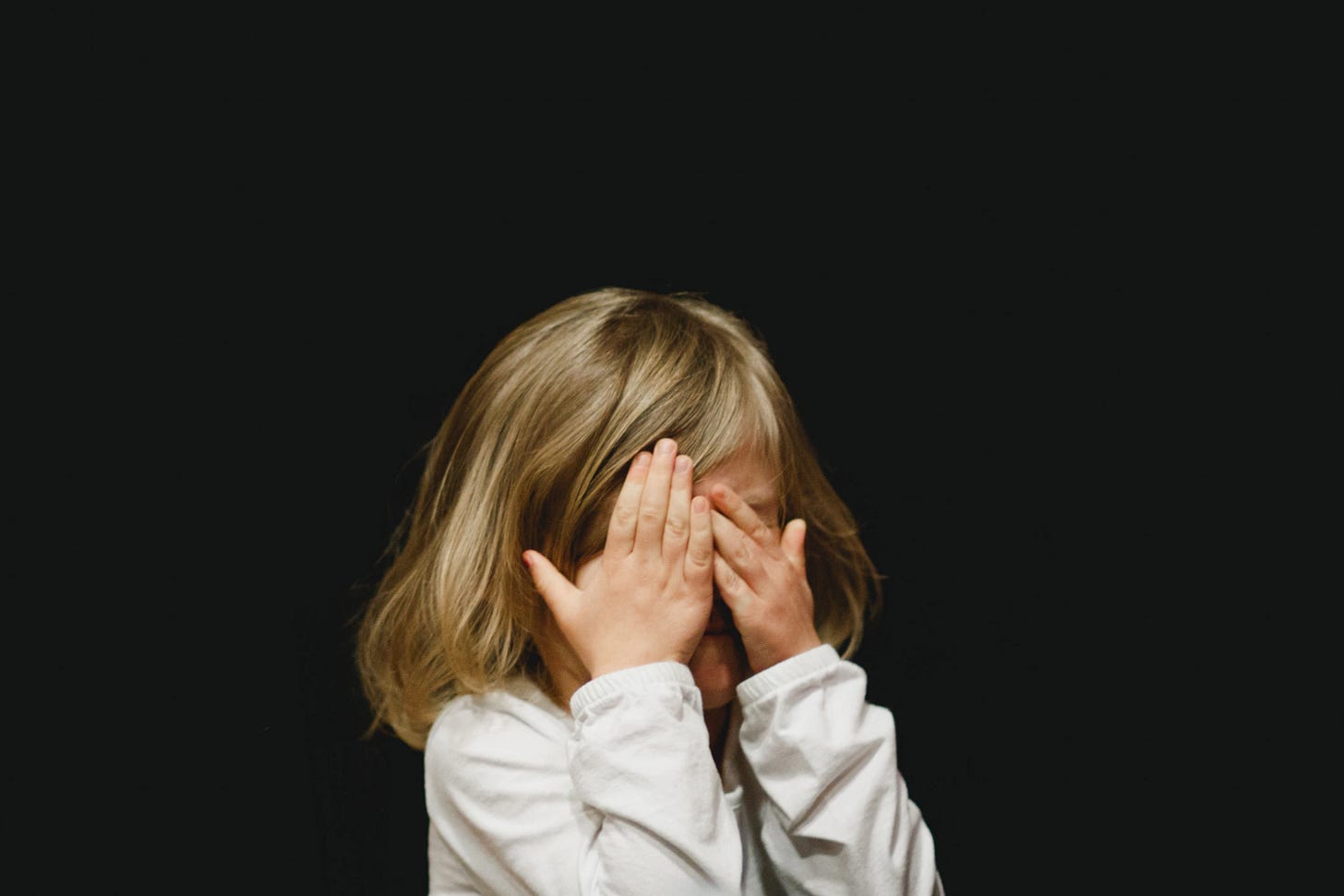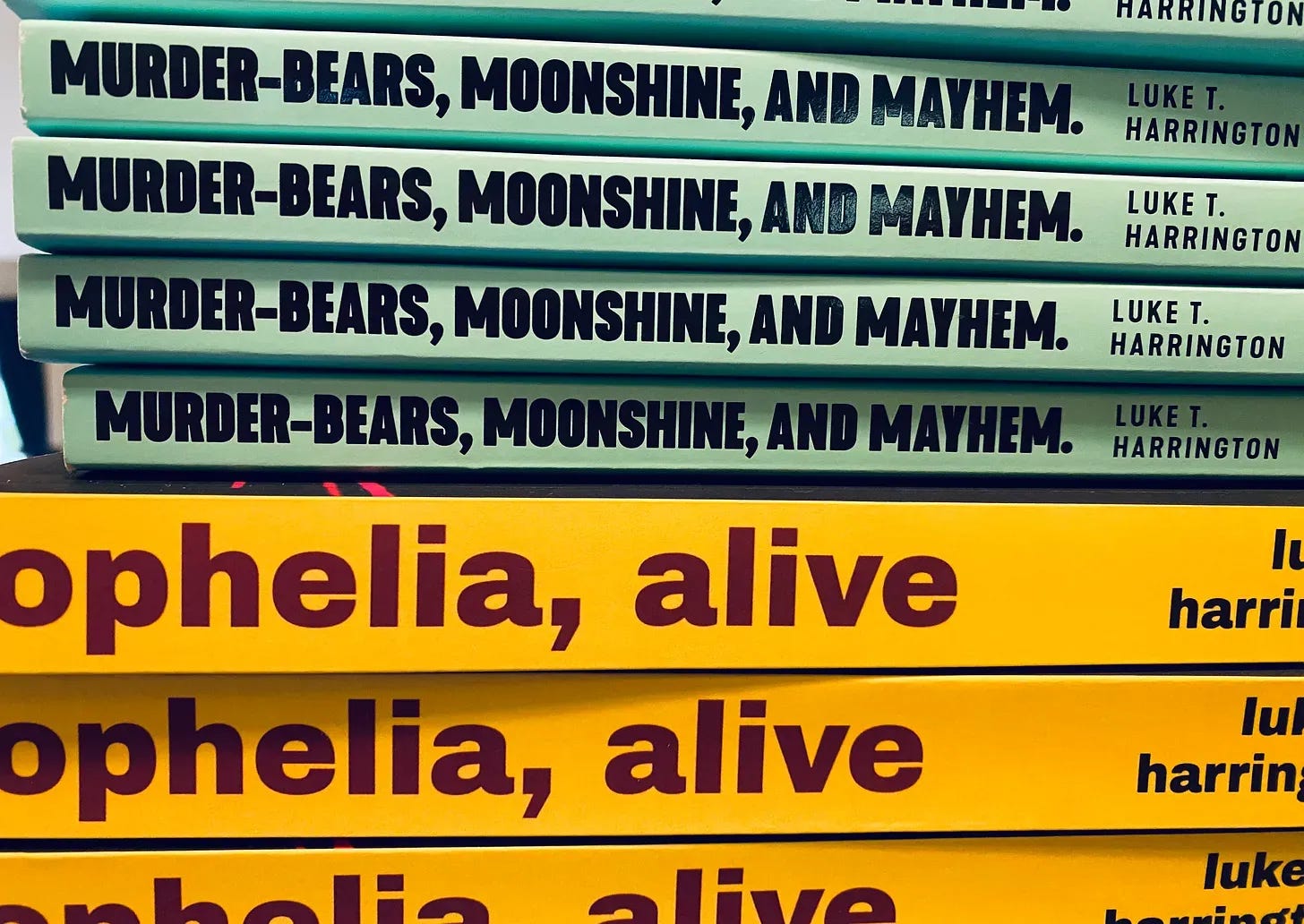Your kids can (probably) handle more than you think
Ask a church receptionist #1
Welcome to the inaugural edition of Ask a church receptionist, a monthly column where I answer your questions about the Bible, Christianity, and that weird rash you’ve been developing lately. We’ll kick things off with this one:
Dear church receptionist,
“My (almost) two-year-old daughter got baptized yesterday. She got two Bibles for children as gifts and we read a few stories together. We read the story of Noah’s Ark, among others, because she got it as a toy set as well. She seemed to get a little overwhelmed and I don’t know how to tell her about the more gruesome parts of the Bible, especially the crucifixion. What are your experiences as a father with that and might it be better to wait a little bit before telling her certain stories?”
—Phil
Dear Phil,
A bajillion people (including the hack who wrote this book) have made this joke already, but it really is weird that so many of us treat Noah’s Ark like a children’s story. Like, yes, a boat overflowing with lions and giraffes is pretty cute, but we’re talking about a story where God does a genocide on almost the entire world. Certain people were upset when Darren Aronofsky turned it into a gritty, violent thriller, but that approach made a lot more sense than turning it into a cutesy direct-to-DVD movie featuring Wayne Brady as the singing broccolini, which I swear is a real thing that happened and not a fever dream I had.
But still, giraffes! So cute!
If you’re one of those 2000s-era Edgy Internet Atheists™️ (which, if you are, welcome! love the fedora!), your response to all this will be something witty like “lololololol, the Bible is inappropriate for children, roflcopter”—and you won’t be entirely wrong! The Bible was not written with children primarily in mind! But really, this question gets at a question all parents have to deal with, whether they’re religious or not: How do I introduce my kids to troubling things?
Because I hope we can all agree on at least some of the following (article continues after the break):
Hey there, stranger! Welcome to my newsletter. If you sign up to receive it in your email inbox, I’ll send you e-copies of both my published books for free, and enter you in a drawing to win a signed paperback copy of each. You can scroll to the bottom of this post for more info, or else just enter your email address here:
1. The world is full of terrible things, and we all have to live in it.
I keep seeing a quote from kid lit author N. D. Wilson that goes, “The world is rated R, and no one is checking IDs.” Obviously, Wilson is wrong about this: the world is actually rated NC-17, or else it would be impossible to make an NC-17-rated film (when in fact it’s only impossible for MPA-member studios). Still, Wilson’s got the broad strokes right: there are all sorts of horrific things out there, from nuclear war to midget porn to Kardashians, and you can’t shield your kids from all of it forever. So the question for the serious parent becomes less “How can I protect my children from the darkness?” and more “How can I raise my kids into adults who push against the darkness instead of succumbing to it (or, worse, joining in with it), without traumatizing them for life?”—which, of course, is a very different question.
The good news is:
2. Your kids (and people in general) are probably harder to traumatize than you think.
On the internet, there are few things that grant you more status than having “trauma,” but the data suggest true post-traumatic stress disorder is actually pretty rare, even among those who’ve had traumatic experiences—more than ninety percent of the “traumatized” never develop PTSD, and of the handful who do, many recover within a few months. Likewise, the data are pretty open-and-shut on “trigger warnings”: they don’t work, and if anything, they only increase the emotional pain of the people they’re designed to protect.
That last point makes particular sense when you consider that one of the recommended treatments for PTSD is “exposure therapy,” in which the patient is gradually exposed to his or her triggers in a controlled and safe setting. Turns out that facing your fears is preferable to running from them—who knew (aside from everyone from Seneca to the Buddha to Nietzsche to Mister Rogers)? Experiencing upsetting art and literature isn’t exactly like exposure therapy, but it has at least one thing in common with it: it allows us to confront potentially scary things in a context where we know they can’t hurt us. Just in principle, this seems like something to be desired rather than something to be feared.
Historically, most cultures have understood this implicitly; for proof, just read their children’s stories. (Grimms’ Fairy Tales are a good place to start—those things are filled with child abuse, cannibalism, and a disturbing number of Disney Princesses.) It’s not a coincidence that the cultures best-known for bowdlerizing their children’s entertainment—Victorian England and 1950s America—were eras of unprecedented peace and prosperity with burgeoning middle classes that could afford the luxury of sheltering their children from the world indefinitely. Historically, most cultures couldn’t afford this—their kids either grew up fast or ended up eaten by witches in gingerbread houses (I assume).
We all want our kids to be “innocent” in the sense of “not guilty of felonies,” but keeping your kids “innocent” in the sense of “naïve” is only for the most privileged among us. So park your kids in front of A Serbian Film, right?
I mean, probably not. Instead I recommend:
3. You can put your kid(s) in the driver’s seat. (Not…not literally.)
This all comes down to the principle of know-your-kid: I would let your daughter direct things. Read her the stories she’s interested in, reassure her that she’s safe, and answer her questions honestly. If she’s getting scared or upset, let her know that she doesn’t have to keep going and you can read her a different story tonight.
I have two daughters, and I’ve found they’re very different in terms of what they can handle. My older, neurotypical daughter has always deliberately sought out mature and upsetting things; I think she’s read my book cover-to-cover three or four times at this point. When she asks me a question about a delicate topic (“Dad, what’s a ‘Snyder cut’?), I usually just give her a straight answer (“Imagine a boot stomping on a be-spandex’d crotch—forever”).
My younger, autistic daughter, on the other hand, can be a lot more sensitive to upsetting realities, so I’ve developed the habit of letting her opt out when she needs to. When she asks a question with an unpleasant answer (“Dad, is Andrew Lloyd Weber writing another musical?”), I’ll usually ask, “Do you really want to know? The answer might upset you.” Sometimes she’ll say say yes, sometimes she’ll decline—and yes, she’ll eventually have to learn the horrifying facts of life (Andrew Lloyd Weber is always writing another musical), but I’m letting her learn them at her own pace.
And now is when we move from the general to the specific:
4. The crucifixion might be a special case.
This is the part of the article where I get a touch Christiany and preachy, so if any readers want to bail, now’s your chance. (Yes, that was a trigger warning—which, according to research, will actually make you more likely to keep reading, so, yeah.)
I do think your question about the crucifixion is the crux, so to speak, of all of this: namely, that the cross is the the answer—and really, the only answer there could be—to all of life’s horrors. The answer to death, violence, and suffering isn’t a sword, or a shield, or a magic wand—it’s the God of the universe absorbing all of them into his own flesh and bone and exploding them from the inside. Death couldn’t handle him, and the grave couldn’t hold him, as Baptist preacher S. M. Lockridge memorably put it.
I’ve found this is the best way to approach upsetting topics with my daughters: to remind them that anything they’re scared of, and anything they’ll suffer, Christ has already suffered for them, will suffer alongside them, and will utterly destroy in the end. You’re worried about death? Great news: it’s already been cast into the pit where it belongs.
That’s one of those truths that can take years to wrap your head around, and not every two-year-old can understand the profundity of it. The good news, though, is that you’ve got plenty of time to explain these things to her. In the meantime, just make sure she knows she’s loved. You’d be surprised how far that bit of knowledge can go.
Good luck!
—The church receptionist
Got a question about the Bible, Christianity, or anything else for a real, honest-to-God church receptionist who literally wrote the book on the Bible? Send it to luke.t.harrington@gmail.com, or just click the button below:
⬅ In case you missed it: God, Disney Princesses, Little Shop of Horrors, and my tenuous relationship with reality
I’m practically giving books away
Hey, thanks for reading! If you’re new to this newsletter, here’s how it works: everyone who signs up to receive it in their email inbox gets free e-book copies of both my published books, plus you get entered in a monthly drawing for a free signed paperback copy of each! Why? Because I like you.
So, just for signing up, you’ll get:
Ophelia, Alive: A Ghost Story, my debut novel about ghosts, zombies, Hamlet, and higher-ed angst. Won a few minor awards, might be good.
Murder-Bears, Moonshine, and Mayhem: Strange Stories from the Bible to Leave You Amused, Bemused, and (Hopefully) Informed, an irreverent tour of the weirdest bits of the Christian and Jewish Scriptures. Also won a few minor awards, also might be good.
…plus:
a monthly update on my ✨glamorous life as an author✨ (i.e., mostly stories about me lying around the house, playing videogames, petting my dogs, etc.)
“Ask a church receptionist,” where I answer your questions about the Bible, Christianity, and whatever else!
my monthly thoughts on horror, the publishing industry, and why social media is just the worst.
Just enter your email address below, and you’ll receive a biweekly reminder that I still exist:
Congrats to last month’s winners, jolleyhd and stricklina! (If you are one of those people, please reach out to me! I’ve emailed you twice to no response!) I’ll run the next drawing Apr. 1!






"I’ve found this is the best way to approach upsetting topics with my daughters: to remind them that anything they’re scared of, and anything they’ll suffer, Christ has already suffered for them, will suffer alongside them, and will utterly destroy in the end. You’re worried about death? Great news: it’s already been cast into the pit where it belongs."
This is fascinating to me, because while I wasn't raised Christian and am not now, the closest thing to a religious experience I can remember having was as a small child (6?) coming to what felt like the full understanding of this concept (plus the original sin idea), and feeling utter and complete despair, that a world where that was true would be too awful to fully comprehend, and meaningless. So, uh, your mileage may vary, I guess? my response is certainly the rarer one though, and you likely need to start out kinda atheistic to get there.
"The answer... [is] the God of the universe absorbing all [evil things] into his own flesh and bone and exploding them from the inside."
But that's how the Matrix trilogy ended, and it was awful. And they made a fourth one, anyway, so... checkmate, Christianity.